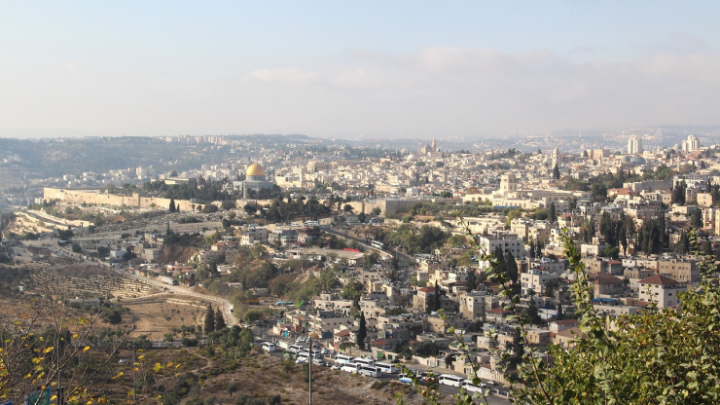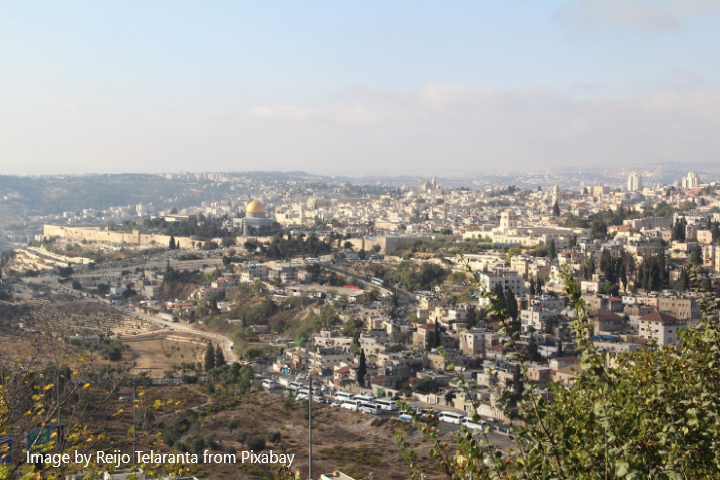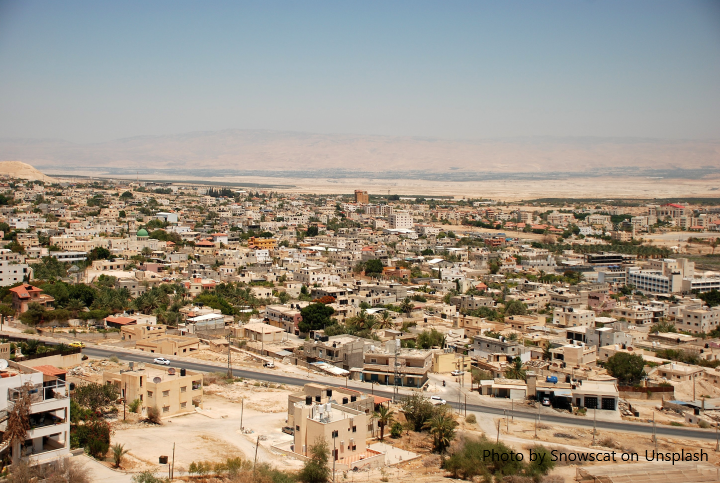One of my favorite sites while on pilgrimage in Israel is a stop atop Mount Scopus. Because it is the highest peak of the Mount of Olives (which actually is a mountain ridge and not a singular summit) it provides a panoramic view of the area around it. The peak gets its name because it provides a perfect lookout (scope) of the city and was used by invading armies to plan their attacks. Titus, the Roman general who conquered Jerusalem, is said to have made his headquarters on this elevation.
The view from Mount Scopus is majestic. Looking west, one can see clearly the Temple Mount, the city of Jerusalem and the Judean Mountains. (see left picture below) This view is largely green, because there is enough rainfall for trees, grass and crops to grow. Turning around, and looking east, if there is not too much haze, one can gaze at the vast Judean wilderness all the way to Jericho, the Dead Sea and the Jordan River. (see right picture below) As opposite as the direction, so is flora. The Judean wilderness is largely gray or reddish brown with little to no vegetation. However, near the horizon, one can barely see the greenery of trees in Jericho and especially in the Jordan valley. As the bus nears either Jericho or the Jordan valley, one notices just how green the area is, filled with grass, banana trees and palm trees.
This mental image of the westward view comes to my mind when I read Psalm 1. The stark contrast between the dry and barren Judean wilderness and the verdant fields and orchards near the Jordan River make clear the distinction found in Psalm 1. The “wicked” are like chaff that fade quickly and are blown away. Those who “delight in the law of the Lord” are like trees, planted by streams of water. They yield fruit, prosper and do not whither.
According to the psalmist, the key to existing as an enduring and fruitful tree as opposed to the wind-driven and impermanent chaff is one’s relation to God’s law. I realize that following Paul’s proclamation in Galatians 5:1, “For freedom Christ set us free …” and his vociferous arguments against the “law” in that same epistle, saying that we should be rooted in the “law of the Lord” to find vitality and perseverance seems counter intuitive. However, it is important to remember the terms and how they are used. In Galatians, it can be argued, Paul is attacking a practice of legalism that makes fulfilling commands salvific. “Law,” in the Old Testament, is translated from the term “Torah,” which can be translated more expansively as instruction.
God’s instruction (law) is neither capricious nor malicious. Rather, God seeks to guide us into thoughts and behaviors that lead us into the fullness of life. Following God’s instruction opens us to a life that is filled with joy, meaning and significance. However, often divine directives will seem counterintuitive to what our culture claims is the path to a full life. In the lectionary Gospel lessons for last week and this week, Jesus offered two such principles. The first is that when we seek our life, we will lose it in the process. However, giving ourselves over to the gospel and its ongoing mission of outreaching love, we will actually find life. This week, Jesus teaches that true greatness comes not in power over others, but the power to serve in humility, even welcoming those who are at the very fringes of society’s hierarchy.
Within our world, there are a number of places we can go for advice or choose paths for authenticity or seek to sit and find comfort for our souls (to use the images of Psalm 1:1). Unfortunately, none of these will connect us to the divine source of spiritual nourishment which brings fruitfulness, endurance and fullness of life. I pray that the roots of your faith are connected to the waters of eternal life and you remain refreshed in your soul and effective in your witness.

If you would like to view past editions of Moments with Mike, follow this link: https://corridordistrictnc.org/category/from-the-ds/



